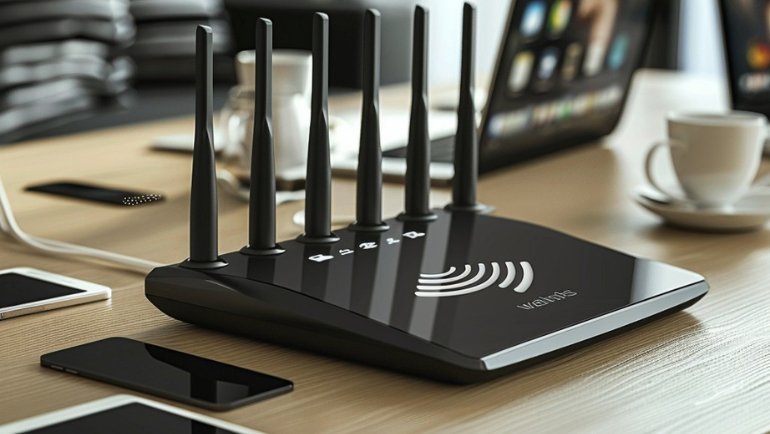
- Frequency Bands
- Speed
- Range
- Ethernet Ports
- Reliability
- Security
- Wi-Fi Technology
- User Interface
- Compatibility
- Pricing
The increasing demand for network connectivity makes it imperative for enterprises to buy the best routers available in the market. However, various brands of routers such as TP-link & Netgear can make the process confusing as both are reliable in their own right. In this article, we will compare the two best wireless router brands TP-link vs. Netgear to help you make an informed decision.
TP-Link vs. Netgear Router: Differences & Similarities
TP-link & Netgear routers offer a variety of choices such as frequency bands, Wi-Fi technology, and more for consistent reliable connectivity. The following section will highlight some differences & similarities between TP-link vs. Netgear in detail before you buy wireless routers.
TP-Link vs. Netgear Router: Frequency Bands

TP-links predominantly come in two bands, 2.5 & 5 GHz respectively, while Netgear routers are available in single, dual, and tri-band technologies. In both routers, the 2.5 GHz band offers a broader network range, making it suitable for larger areas. Conversely, 5 GHz bands provide faster internet speed over short ranges, but with limited range.
TP-Link vs. Netgear Router: Speed
The speed of wireless routers like Netgear or TP-link is a crucial step before considering any one over another. TP-link routers offer a speed of 733 Mbps, while Netgear offers 1200 Mbps which is much faster. TP-link router speed is a split between 2.5 GHz & 5 GHz frequency bands but ensures the quickest path for maximum speed using Adaptive Path Selection.
In contrast, Netgear uses both Wi-Fi bands simultaneously and provides a single high-speed consistent connection using its Fast Lane Technology.
TP-Link vs. Netgear Router: Range

The range is another important factor to have in either TP-Link or Netgear wireless routers. Both routers offer the same coverage area of around 1200 Sq.ft which may vary depending on the model. The major difference between the TP-link & Netgear routers range is the difference in technology. TP-link has roaming technology that automatically adjusts to the strongest signals present in the vicinity.
On the other hand, Netgear with its beamforming technology focuses Wi-Fi signals on the connected devices instead of spreading them everywhere. In the real world, a multitude of factors affect the range of routers from any Popular IT hardware brands like interference. This is why, enterprises buy wireless access points with routers to enhance their network coverage area for better internet connectivity.
TP-Link vs. Netgear Router: Ethernet Ports

For stable internet access, a direct ethernet connection of your device with either a TP-link or Netgear router is the best option. The number of ports available in both routers is limited and can’t connect to multiple devices. Therefore, most large enterprises prefer to buy network switches with wireless routers to increase ethernet port availability.
TP-Link vs. Netgear Router: Reliability
Every router has a built-in CPU & RAM, providing stable internet connectivity to the connected devices. The greater the number of devices, the more heat the router will generate, which can be encountered by buying cooling fans. However, higher-quality TP-link & Netgear routers can adapt to heavy workloads, maintaining a reliable & consistent internet connection.
TP-Link vs. Netgear Router: Security
Both routers come up with parental control technology, which monitors & restricts access to anti-productive sites. Moreover, some TP-link routers have enterprise-grade free security features, while Netgear routers offer a paid security program. However, these security measures are not very effective against cyber attacks and require you to buy firewalls for an extra layer of protection.
TP-Link vs. Netgear Router: Wi-Fi Technology

Many Wi-Fi technologies are available in both TP-link & Netgear routers such as 802.11ac, 802.11ax (Wi-Fi 6), different frequency bands & more. Each technology helps the router provide better and faster internet connectivity for your devices. It’s important to note that TP-link & Netgear technologies can vary from model to model like beamforming in Netgear vs. roaming of TP-link and so on.
TP-Link vs. Netgear Router: User Interface
TP-link routers have user-friendly interfaces, which can be understood by most users. In contrast, Netgear routers have complex interfaces with multiple settings, making them difficult to configure.
TP-Link vs. Netgear Router: Compatibility
Enterprises require a router that is compatible with various wireless accessories like network transceivers or switches, making scalability easier. Both TP-Link & Netgear routers are backward compatible and can connect to various networking devices and some even offer remote accessibility. This enhanced scalability motivates enterprises to buy wireless LAN cards for their desktop computer to connect them wirelessly.
TP-Link vs. Netgear Router: Pricing
The price of a TP-link & Netgear both brands router range from $24 to $1750. It varies based on Wi-Fi technology, number of bands, quality, model & more. However, the price range could vary if you buy network cables for wired connections of your devices.
TP-Link vs. Netgear: Which One to Choose?
Choosing the best router for your needs requires careful consideration of the requirements, specifications & budget. TP-link & Netgear both offer considerable advantages and some limitations, which can make the buying process difficult.
Computing Worlds offers a variety of wireless routers from the collection of networking & accessories for sale, to help you make the right choice. Here are some best TP-link & Netgear wireless routers to look into.
TP-link Router
Netgear Router
You can also request a bulk quote online for the top T-p Links and Netgear Routers.
Frequently Ask Questions:
Is Tp Link Router Compatible with Netgear Modem?
Yes, in most cases TP-link router is compatible with a Netgear modem, if both follow the same networking standards like 802.11ax and so on.
Which Router Is Better Netgear or TP Link?
In terms of cost, TP-link is much more cost-effective than Netgear. However, Netgear provides faster internet speed compared to TP-link.
In conclusion, TP-link is a cost-effective option for long-range & reliable internet access, while Netgear is expensive but has robust speed. All aforementioned differences & similarities make each router unique. Choosing one requires careful comparison between your needs & choices available for scalability. This marks the end of our detailed comparison between Netgear vs. TP-link routers.
Stay tuned to the Computing Worlds blog for more information about routers.






